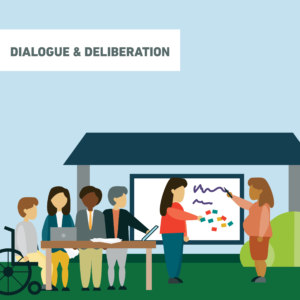 Dialogue and deliberation programs are facilitated sessions that bring together people to discuss societal issues of concern and to develop community-driven recommendations and policy solutions, including increasing understanding of scientific topics as well as resolving conflicts.1 Dialogue and deliberation refers to a set of methods for engaging community members in discussions that surface or refine community priorities and support decision making around difficult complex societal challenges that lie at the intersection of science, technology, and human well-being, such as climate change and sustainability, consumer genetics and vaccines, and the relationship of artificial intelligence to the future of work. Dialogue encourages openness, respect, and the ability to find common ground, among other qualities; deliberation draws on this dialogue to help participants seek more information and evidence, evaluate various options while potentially changing or re-examining preferences or beliefs, and, eventually, come to agreement to make informed decisions.2
Dialogue and deliberation programs are facilitated sessions that bring together people to discuss societal issues of concern and to develop community-driven recommendations and policy solutions, including increasing understanding of scientific topics as well as resolving conflicts.1 Dialogue and deliberation refers to a set of methods for engaging community members in discussions that surface or refine community priorities and support decision making around difficult complex societal challenges that lie at the intersection of science, technology, and human well-being, such as climate change and sustainability, consumer genetics and vaccines, and the relationship of artificial intelligence to the future of work. Dialogue encourages openness, respect, and the ability to find common ground, among other qualities; deliberation draws on this dialogue to help participants seek more information and evidence, evaluate various options while potentially changing or re-examining preferences or beliefs, and, eventually, come to agreement to make informed decisions.2
Dialogue and deliberation, when employed well,3, 4 are processes that have the potential to bring more and diverse voices to the table, break down barriers and power dynamics, and develop resolutions and solutions that work for the majority of people.5 The application of dialogue and deliberation in science communication and engagement spaces can take many different forms, including public forums like town halls and world cafés, and in more specific programming like workshops and summits. While the form may vary, nearly all dialogue and deliberation programs involve facilitators, issue framing and discussion materials, including insights from the general public, stakeholders, and experts to inform decision-making efforts.6 community priorities and support decision making around difficult complex societal challenges that lie at the intersection of science, technology, and human well-being, such as climate change and sustainability, consumer genetics and vaccines, and the relationship of artificial intelligence to the future of work. Dialogue encourages openness, respect, and the ability to find common ground, among other qualities; deliberation draws on this dialogue to help participants seek more information and evidence, evaluate various options while potentially changing or re-examining preferences or beliefs, and, eventually, come to agreement to make informed decisions.7
Many groups use extended dialogue and deliberation engagements with community partners to foster stronger relationships with communities and inform local policymaking. Many of these engagements are public-private partnerships. For example, the Resilience Dialogues, supported by the Kresge Foundation, is a collaboration between the American Society of Adaptation Professionals and the U.S. Global Change Research Program, along with support from the Thriving Earth Exchange, Meridian Institute, and others. This programming leverages the public and private sectors to bring in stakeholders—including scientists, public health experts, governments, community organizations, private stakeholders, urban planners, and more—for discussions about the issues faced in the community and to develop solutions driven and supported by the community.8
1National Council for Dialogue & Deliberation, “Resource Guide of Public Engagement” (National Council for Dialogue & Deliberation, October 2010).
2Oliver Escobar, “Public dialogue and deliberation: A communication perspective for public engagement practitioners” (UK Beacons for Public Engagement, 2011). See p. 22, Dynamics of Dialogue.
3Alice Siu, “Deliberation & the Challenge of Inequality,” Daedalus 146, no. 3 (2017): pp. 119-128.
4Monique Deveaux, “Deliberative Democracy and Multiculturalism,” The Oxford Handbook of Deliberative Democracy, June 2018, pp. 155-170.
5Arthur Lupia and Anne Norton, “Inequality Is Always in the Room: Language & Power in Deliberative Democracy,” Daedalus 146, no. 3 (2017): pp. 64-76.
6National Council for Dialogue & Deliberation, “Resource Guide of Public Engagement” (National Council for Dialogue & Deliberation, October 2010).
7Oliver Escobar, “Public dialogue and deliberation: A communication perspective for public engagement practitioners” (UK Beacons for Public Engagement, 2011). See p. 34, Qualities of Deliberation.
8Connecting Experts & Communities for Resilience (Resilience Dialogues).